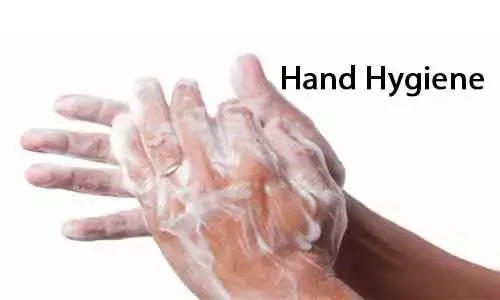- Home
- Medical news & Guidelines
- Anesthesiology
- Cardiology and CTVS
- Critical Care
- Dentistry
- Dermatology
- Diabetes and Endocrinology
- ENT
- Gastroenterology
- Medicine
- Nephrology
- Neurology
- Obstretics-Gynaecology
- Oncology
- Ophthalmology
- Orthopaedics
- Pediatrics-Neonatology
- Psychiatry
- Pulmonology
- Radiology
- Surgery
- Urology
- Laboratory Medicine
- Diet
- Nursing
- Paramedical
- Physiotherapy
- Health news
- Fact Check
- Bone Health Fact Check
- Brain Health Fact Check
- Cancer Related Fact Check
- Child Care Fact Check
- Dental and oral health fact check
- Diabetes and metabolic health fact check
- Diet and Nutrition Fact Check
- Eye and ENT Care Fact Check
- Fitness fact check
- Gut health fact check
- Heart health fact check
- Kidney health fact check
- Medical education fact check
- Men's health fact check
- Respiratory fact check
- Skin and hair care fact check
- Vaccine and Immunization fact check
- Women's health fact check
- AYUSH
- State News
- Andaman and Nicobar Islands
- Andhra Pradesh
- Arunachal Pradesh
- Assam
- Bihar
- Chandigarh
- Chattisgarh
- Dadra and Nagar Haveli
- Daman and Diu
- Delhi
- Goa
- Gujarat
- Haryana
- Himachal Pradesh
- Jammu & Kashmir
- Jharkhand
- Karnataka
- Kerala
- Ladakh
- Lakshadweep
- Madhya Pradesh
- Maharashtra
- Manipur
- Meghalaya
- Mizoram
- Nagaland
- Odisha
- Puducherry
- Punjab
- Rajasthan
- Sikkim
- Tamil Nadu
- Telangana
- Tripura
- Uttar Pradesh
- Uttrakhand
- West Bengal
- Medical Education
- Industry
Hand dermatitis in two thirds of public due to stringent hand hygiene during COVID

LUGANO - The dermatological impact of COVID-19 is a burning topic at EADV's 2021 Spring Symposium. New research presented today highlights the effect that stringent hand hygiene during the pandemic has had on hand skin health.1
Researchers at Father Muller Medical College, India, analysed transepidermal water loss (TEWL - an essential parameter for measuring skin barrier function) from 582 people (291 healthcare professionals (HCPs) and 291 healthy individuals from the general population). Results indicated that hand dermatitis was now present among 92.6% of HCPs and 68.7% of the general population, despite only ~3% of HCPs and 2.4% of the general public in the study having reported a prior history of hand dermatitis (obtained through medical history and self-reported history). Higher mean TEWL (dryer skin) was also noted in females (65.4 g/m2h) and intensive care professionals (58.2 g/m2h), which was associated with high frequency of hand washing and use of alcohol-based hand rubs.
Both the HCPs and participants from the general public in this study stated that skin irritation and dryness was the main barrier to the consistent practice of hand hygiene (as reported by 72.1% of HCPs, and 50.8% of healthy volunteers).
Dr Monisha Madhumita, Father Muller Medical College, India explains: "This research truly demonstrates the impact of increased hand washing and uptake of alcohol-based rubs on the hand skin health of HCPs and the general public. Moreover, we now know that using TEWL to measure skin barrier function can help us compare the efficacy of various barrier protective measures, and discover suitable modifications of hand hygiene practices and products to help prevent hand eczema. Finding suitable modifications to practices and products that may increase the accessibility of proper hand hygiene is something of vital importance to many in our community."
Marie-Aleth Richard, EADV Board Member and Professor at the University Hospital of La Timone, Marseille, adds: "This research shows there is now a skin-disease epidemic within the COVID-19 pandemic. It is promising to see this problem being recognised, and I am excited to see how the dermatology community goes about finding potential solutions to this issue."
Hina Zahid Joined Medical Dialogue in 2017 with a passion to work as a Reporter. She coordinates with various national and international journals and association and covers all the stories related to Medical guidelines, Medical Journals, rare medical surgeries as well as all the updates in the medical field. Email: editorial@medicaldialogues.in. Contact no. 011-43720751
Dr Kamal Kant Kohli-MBBS, DTCD- a chest specialist with more than 30 years of practice and a flair for writing clinical articles, Dr Kamal Kant Kohli joined Medical Dialogues as a Chief Editor of Medical News. Besides writing articles, as an editor, he proofreads and verifies all the medical content published on Medical Dialogues including those coming from journals, studies,medical conferences,guidelines etc. Email: drkohli@medicaldialogues.in. Contact no. 011-43720751


